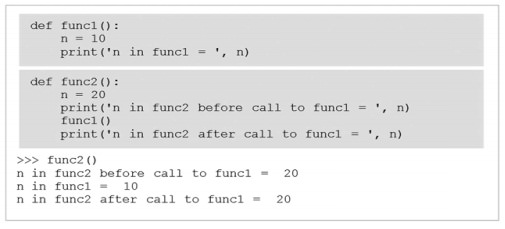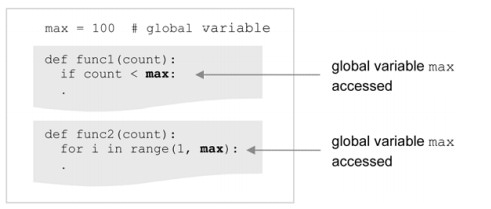Chapter: Problem Solving and Python Programming : Data, Expressions, Statements
Parameters and arguments - Python
Parameters and arguments
Some of
the built-in functions we have seen require arguments. For example, when you call
math.sin you pass a number as an argument. Some functions take more than one
argument: math.pow takes two, the base and the exponent.
Inside
the function, the arguments are assigned to variables called parameters. Here
is an example of a user-defined function that takes an argument:
Eg: def
print_twice(bruce):
print
bruce
print
bruce
This
function assigns the argument to a parameter named bruce. When the function is called,
it prints the value of the parameter (whatever it is) twice.
This
function works with any value that can be printed.
>>>
print_twice('Spam')
Spam
Spam
>>>
print_twice(17)
17
17
>>>
print_twice(math.pi)
3.14159265359
3.14159265359
Parameter Passing
Parameter
passing is the process of passing arguments to a function. There are two types of
arguments: Actual arguments and formal arguments. Actual arguments are the
values passed to a function’s formal parameters to be operated on.
Eg:
def f(x):
#name x used as formal parameter
y = 1
x = x + y
print 'x
=', x
return x
x = 3
y = 2
z = f(x)
#value of x used as actual parameter
print 'z
=', z
print 'x
=', x
print 'y
=', y
When run,
this code prints,
x = 4
z = 4
x = 3
y = 2
A default argument is an argument that
can be optionally provided in a given function call. When not provided, the
corresponding parameter provides a default value.
Eg:
def
greet(name, msg = "Good morning!"):
"""
This
function greets to
the
person with the
provided
message.
If
message is not provided,
it
defaults to "Good
morning!"
"""
print("Hello",name
+ ', ' + msg)
greet("Kate")
greet("Bruce","How
do you do?")
Output:
Hello
Kate, Good morning!
Hello
Bruce, How do you do?
Scope and Lifetime of variables
Scope of
a variable is the portion of a program where the variable is recognized. Parameters
and variables defined inside a function is not visible from outside. Hence,
they have a local scope.
Lifetime
of a variable is the period throughout which the variable exits in the memory.
The
lifetime of variables inside a function is as long as the function executes.
They are
destroyed once we return from the function. Hence, a function does not remember
the value of a variable from its previous calls.
Eg:
def
my_func():
x = 10
print("Value
inside function:",x)
x = 20
my_func()
print("Value
outside function:",x)
Output:
Value inside function: 10
Value outside function: 20
Local Scope and Local Variables
A local variable is a variable that is
only accessible from within a given function. Such variables are said to have local scope .

Global Variables and Global Scope
A global variable is a variable that is
defined outside of any function definition. Such variables are said to have global scope.

Variable
max is defi ned outside func1 and func2 and therefore “global” to each.
Related Topics